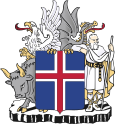Background
The then Social Democratic Alliance led government of Iceland applied to join the EU in July 2009 after the country suffered a severe financial crisis. Despite three years of negotiations, several major issues remain outstanding, including the Common Fisheries Policy. [1] On 14 January, the Icelandic government announced that negotiations would be suspended until after the parliamentary election in April. [2] No new chapters will be opened prior to the election, though negotiations will continue on chapters that have already been opened. [3] The ruling left-wing parties suffered a major defeat in the elections, while the centrist Progressive Party had a large victory.
The leaders of the Progressive Party and the Independence Party, which both oppose Icelandic EU membership, announced on 22 May 2013 that a coalition platform had been reached that would suspend all accession talks with the EU and not resume them unless first approved by a referendum. [1] [4] [5] The advisor to Sigmundur Davíð Gunnlaugsson, the incoming Prime Minister, stated that "later in the term there will be a referendum on whether Iceland should continue the talks, although no date has been decided." [6] [7] The new Finance Minister Bjarni Benediktsson stated that "We believe the accession talks were started without the necessary support in Iceland. We will not go further with the talks. We also have to listen to what the EU has to say about our approach; maybe it will make no sense to hold a referendum" [8]
On 22 February, the governing parties agreed to formally withdraw the membership application, without first holding a referendum on the matter, and submitted a bill to parliament seeking their approval to do so. [9] [10] However, on February 25, Ragnheiður Ríkharðsdóttir, Chairman of the Independence Party parliamentarian group, announced her intention to not vote in favour of the proposal. [11]
The Independence/Progressive coalition lost its majority in the 2016 Icelandic parliamentary election. After several failed attempts to form a government from alternative combinations, a new coalition was formed in January 2017, led by the Independence party and joined by Regeneration and Bright Future, both of whom support EU membership and the former of whom was originally a splinter movement that left the Independence party over this very issue. The coalition deal included a pledge to hold a parliamentary vote on whether to hold an EU membership referendum.
On 21 March 2022, party leaders from the Social Democratic Alliance, the Pirate Party and Viðreisn, have submitted their proposals to the Althing that an EU membership referendum be held before the end of 2022. [12] [13]
On 15 September 2022, the three party leaders from those parties made a draft question to the referendum: "Do you want Iceland to take up the matter in negotiations with the European Union with the aim of concluding a membership agreement that would be submitted to the nation for approval or rejection? Answer options would be yes or no." [14]
On 20 September, the leader of the Social Democratic Alliance, Logi Már Einarsson, wrote a speech for Icelandic President Guðni Th. Jóhannesson requesting the referendum before the end of 2023. [15]
On 23 March 2023, according to Jon Steindor Valdimarsson, as the polls indicates that 66% supported on the referendum, he believed that such scenario would be that such referendum should be held before the next elections in 2025. [16]
On 18 September 2023, a draft bill for the referendum was proposed by Þorgerður Katrín Gunnarsdóttir, with support from the members of the Social Democratic Alliance, the Pirate Party and Viðreisn, including Logi Már. [17] As of 10 October 2024, it is now in the hands of the Foreign Affairs Committee. [17]
Following the 2024 Icelandic parliamentary election, the Social Democratic Alliance, Viðreisn and People's Party formed a new coalition government, which agreed to hold a referendum on resuming negotiations on EU membership by 2027. [18] Prior to organizing the referendum, the new government will first establish a panel of independent experts to assess the advantages and disadvantages of retaining the Icelandic crown compared to adopting the euro currency, which it believes will ensure a more mature debate. [19]
In January 2026, the Minister for Foreign Affairs, Þorgerður Katrín Gunnarsdóttir said the government intends to bring a parliamentary resolution on the referendum to Althing during spring of 2026. Under Icelandic law, the referendum would have to held within three to twelve months after the approval of the resolution. [20]
